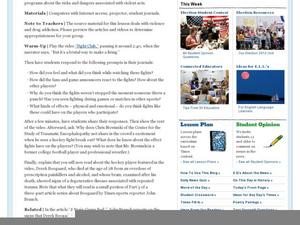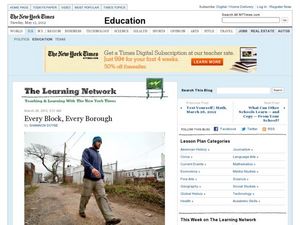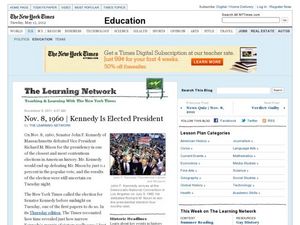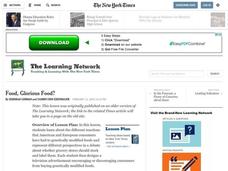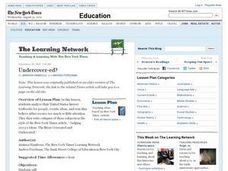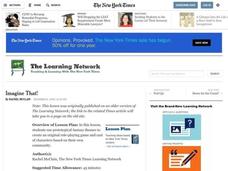Curated OER
On 'Punched Out': Looking at Brain Trauma and Other Risks of Violent Sports
The tragic story of Derek Boogard, a hockey star whose sports-related brain injuries eventually lead to his death, is told through a series of videos. There are also articles that can be read. This poignant lesson gets participants to...
Curated OER
Racial Tensions for Mixed Families
"Racial Tensions for Mixed Families" is the title of the New York Times article your class gets to read, if they click on this resource. They'll read the article then answer 10 comprehension questions.
Curated OER
On the Dots
If you want your class to practice reading informational texts and answering related questions, this short exercise from The New York Times' "Learning Network" might be helpful. It includes an article on Dippin' Dots and uses...
Curated OER
"Every Block, Every Borough"
From the New York Times Learning Network series, this worksheet poses 10 questions on an article entitled, "Leaving His Footprint on the City" about a man planning to walk every street in all five New York boroughs. The prompts address...
Curated OER
Taking Stock Before Iowa
As scholars take in the constant ambush of current events, help them develop media literacy skills by extracting important details from hard news articles. This story from December 2011 presents information on the Republican primaries...
Curated OER
Nov. 8, 1960 | Kennedy Is Elected President
Using the presidential election of 1960 as background information, learners consider the push of electoral reform. They read about the events and issues surrounding President Kennedy's win in 1960 and compare them to the same issues...
Curated OER
Qaddafi Is Dead in Libya
The New York Times posted an article titled, "Qaddafi Is Dead in Libya" back in 2011. Your class gets a chance to read that article to better understand current events and increase their reading comprehension. After reading the article,...
Curated OER
"Sounds Like Team Spirit"
Some sports teams consider their fans the "12th man" on the field. What does that mean? Are fans that important to their teams? Does fan support really help teams win? How can you let your team know you are rooting for them? Apparently,...
Curated OER
The Start of a New Era for Roman Catholics
Read all about it! Check out this article from the New York Times. Kids read about changes made to the wording used in Catholic Mass. They consider these changes by responding to each of the 10 related questions that ask, who, what,...
Curated OER
Casting Doubt: "Color-blind" and Nontraditional Casting Decisions
In his article about color-blind casting entitled, "Willy Loman Is Lost, Still Looking for Stimulus Plan and Some Dignity," Charles Isherwood quotes August Wilson as saying, "To mount an all-black production of a 'Death of a Salesman'...
Curated OER
Everyone's a Critic: Analyzing Sitcoms as Cultural Texts
Start by defining the word sitcom with the goal of launching a discussion. What exactly is a sitcom? How is a sitcom different from sketch comedy, drama, and reality television? Class members give examples, remember storylines they've...
Curated OER
Sound Blending Lesson Plan
Mr. Snowman wants to help emerging readers understand compound words, so he segments some familiar words to help them see that they are made of two distinct words. Learners repeat the words, both segmented and blended, and observe them...
Curated OER
Food, Glorious Food?
How are the reactions between American and European consumers different when it comes to genetically modified foods? Use the New York Times article "Consumers in Europe Resist Gene-Altered Foods" to inform your middle schoolers about the...
Curated OER
Get the Message?
Remember Morse Code? High schoolers investigate ways in which people communicate and assess which communication methods are appropriate and effective in different situations. They evaluate how constant changes in the world of technology...
Curated OER
A Discourse on the History of Language
Analyze and make inferences from the information used by linguists to construct the evolution of languages. They research different dating techniques to explain how scientists infer age with evidence.
Curated OER
Draft Dilemmas
Consider the possibility of a new U.S. draft with this lesson, which encourages class debate and persuasive arguments. Middle and high schoolers discuss how such a draft might be enacted and how they would feel about it. They write...
Curated OER
Knowing Write from Wrong
Explore how the informality of electronic correspondence has affected communications in the workplace. Writers develop pages for a basic writing guide that contains rules and examples to help correct common writing errors. A great way to...
Curated OER
Undercover-ed
Have your class engage in critical-thinking activities using this resource. Learners discuss a variety of topics they think get too much, or too little, attention from the press. They analyze why these topics are over or underrated....
Curated OER
Cite Your Sites!
The New York Times article “Lessons in Internet Plagiarism,” launches a look at how the Internet has increased the prevalence of plagiarism. The richly detailed lesson plan includes warm-up and wrap-up activities, discussion questions,...
Curated OER
Imagine That!
Enter the fantastical world of "Dungeons and Dragons" and other role-playing games with this lesson from The New York Times. Middle schoolers create the outline for a role-playing game based on their own community. Then, they write a...
Curated OER
All the World's a Stage
Is the circus a form of theater? Read "A City of Clowns? What Else Is New?" to sway your class that a circus, is indeed, a theatrical performance. Critical thinkers compare/contrast various forms of theater and identify what makes the...
Curated OER
Science in the Court Room
Share their opinions on the use of DNA databases in criminal investigations. After reading an article, they evaluate the pros and cons of the databases and work in groups to answer discussion questions. They write a letter to a state...
Curated OER
Don't Bet The House On It!
Great real-world math application! Have the class compare and contrast their estimated home price and income data with actual data. In groups, they participate in simulations to discover how the housing market and mortgages operate....
Curated OER
Fun, and Risks, at the Beach in Tel Aviv
After reading the article "Fun, and Risks, at the Beach in Tel Aviv," learners consider eight related questions. They'll answer who, what, when, where, why, and how about the risks several Palestinian women took as they snuck over the...


